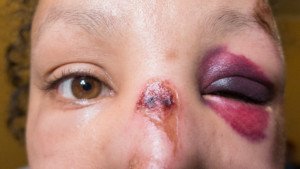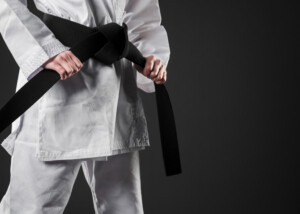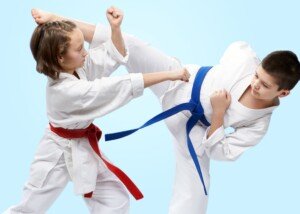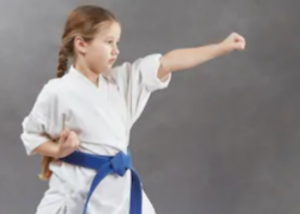Seems that a little girl who takes martial arts lessons will never end up staying in an abusive relationship as a helpless powerless victim.
It’s not always about the ability to knock out a strapping six-foot man.
It’s the ability to feel good enough about yourself, and self-confident enough, NOT to be drawn to violent men in the first place.
Or, to put it another way, feeling secure enough with your place in the world that you’d never STAY with such a man after the first time he exhibits violence.
“Yes, students learn how to physically defend themselves in martial arts classes, but it goes beyond that,” begins Jarrett Arthur, one of the highest ranking female Krav Maga (Israeli self-defense) black belt instructors in America, who teaches children and adults self-defense.
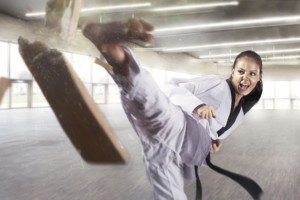
Shutterstock/Fotokvadrat
“The particular life skills taught in martial arts classes can give your child an incomparable boost in their ability to maintain healthy and safe relationships as teens and beyond to adulthood.”
It stands to reason that childhood martial arts training would be a powerful preventive agent in getting involved with an abusive man.
Not that it’s never happened, but let’s take off our blinders and see the logic behind this premise.
“A lack of confidence and self-esteem is one of the biggest factors in young adults and adults engaging in abusive relationships,” explains Arthur.
“Parents have a huge opportunity to build a child’s confidence and subsequently, set them up to be a confident adult.
“Enrolling your child in a martial arts class is one of the best ways to boost their confidence.
“Martial arts curriculums are built to consistently challenge students with difficult but attainable goals, and are quick to highlight achievements through positive praise and celebration both privately (direct praise from a Sensei) and publicly (being awarded with a new belt or stripe in front of the entire class).”
Women Who Stay in Abusive Relationships Lack Self-Advocacy
“Self-advocacy, or an individual’s ability to effectively communicate, convey, negotiate or assert his or her own interests, desires or needs, is a skill often overlooked, partly because it’s mistakenly confused with back-talk or disrespect,” Arthur explains.
“Back-talk is very different from self-advocacy and can be differentiated by tone of voice, body language and subject.
“Your child whining about not wanting to do homework is very different from a child using clear, concise words to tell a bully that what he/she is doing is not okay.
“Martial arts programs tackle this life skill head-on by encouraging respect, while teaching kids how to effectively communicate using their words and body language (like eye contact).
Reputable schools will have students participate in role-playing scenarios so that students can get hands-on practice standing up for what they want and need in appropriate situations (like bullying) in a confident and effective, but respectful way.”
Parents should do their homework when hunting for a high quality martial arts school and not be pressured into signing long-term contracts with so-called black belt factories or “McDojos.”
Arthur continues, “It’s often hard to recognize an abusive relationship, especially one in which no physical abuse takes place.
“While most martial arts schools will leave explicit discussions of abuse off the table, many will lead lessons plans geared towards recognizing situations and relationships that don’t feel good, or ones that are not mutually positive and beneficial.
“I teach kids as young as five the difference between a joke and bullying because it helps them begin to learn what behavior by their peers and partners is ok, and what is not.”

